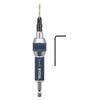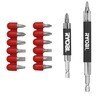An impact
driver is irreplaceable for driving screws. One of the places where I work is almost all 18v dewalt impact drivers- it's often tough to find a drill if you need a
pilot hole or otherwise.
My personal kit has almost always included an impact
driver, but they are often the first tool to disappear on a jobsite (I've had two taken so far, haven't replaced the second one yet). My first was a 14.4v ridgid that had a good amount of
power but no light. My second was an 18v milwaukee that was incredibly powerful and very heavy duty, but the
LED light below the chuck only went on when you were running the gun (the better guns have a two
stage trigger that allows you to turn on the light without running the gun, so you can find your screw in the dark without spinning the
bit).
The best thing about them is their size and
power relative to a similar cordless drill. They can boast 3-4 times to amount of available torque compared to a cordless drill counterpart, and they require so much less effort to drive long screws into harder woods (pressure treated 2x4/4x4, hardwoods,
etc). This allows you to get a lower
voltage (i.e., a good 12v impact
driver will have more driving
power than your average 18v drill) which means your batteries will probably last longer and you'll have a lighter, more easily maneuverable tool.
A note of caution about using drill bits in impact drivers- as the impacts have 1/4" hex chucks designed for short
driver bits, there is often a
bit of slop in the chuck that allows the
bit to move around a little. This is not generally a problem for a 2-3" screwdriver
bit (especially if you have one with a sliding screw guide on it) but once you've put a thin 3" drill
bit or a 6" or so drill/drive
bit kit on it, you'll see that as you spin the drill the end of the
bit will scribe a 1/2" or so circle in the air that means your hole will be less accurate and you'll be much more likely to
snap the
bit. I'd use one in a pinch for drilling, but not as my go-to option.
one other note of caution- impact drivers are very loud. If you are working in an area where there is any concern about noise, you will find yourself reaching for your drills instead because an impact can be deafening, especially in an enclosed space. Use ear protection at all times if possible.
Yet another wrinkle- if you want impact
driver power in a very small package, there are an increasingly large number of "pocket
driver" options from the major manufacturers. These are generally between 10 and 12 volts, use lithium
ion batteries, are roughly the size of your
hand, and can still drive screws with plenty of
power. They're reasonably priced and extremely
portable, and some come with kits (light, mini-sawzall,
etc). Might be worth checking out.






